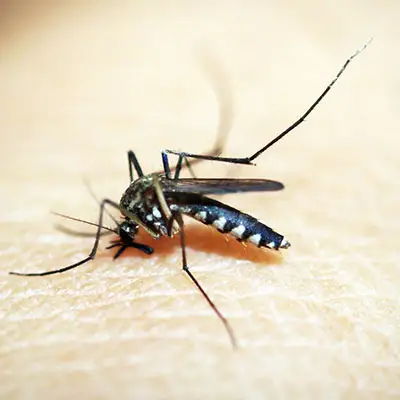You don't need us to tell you about contagious diseases. Thanks to COVID-19, we’re all well aware of the dangers of germs and how some simple precautions can reduce your risk of getting sick. It’s important to continue following these precautions. It’s also important to know what to do when you get sick while traveling, and that includes how travel insurance can help if you need to quarantine. So while you don’t need Seven Corners to tell you to sing the birthday song twice while washing your hands, we can give you some more advanced tips to help you travel safely.
Is It Common to Get Sick While Traveling?
International travelers have a 50% chance of contracting a travel-related illness, according to the Australian government-sponsored resource, Better Health Channel. Additionally, the U.S. Centers for Disease Control (CDC) report that as many as 43-79% of travelers to low- and middle-income countries contract a travel-related illness. In most cases, the illnesses contracted are mild. However, there is always a chance that a traveler could contract a serious illness overseas.
Common travel-related illnesses
While the illnesses below are considered among the most commonly contracted during international travel, their inclusion on this list is not an indication of their severity or ability to be transmitted from person to person. Contact your healthcare provider for more information. You can also reference the CDC’s list of communicable diseases that are subject to federal isolation and quarantine.
- Hepatitis A: This is most common in areas with poor standards of sanitation and food hygiene.
- Malaria: This is most commonly found in Africa, Latin America, and Asia.
- Dengue fever: Dengue is often found in tropical climates, including the Caribbean, Latin America, Southeast Asia and the Pacific Islands.
- Tuberculosis: India and parts of Southeast Asia and Africa account for the most cases of tuberculosis.
- Typhoid: Regions with high cases of typhoid and paratyphoid fever include Asia, Africa, the Caribbean, Latin America, and the Middle East.
- Yellow fever: This is most common throughout Central Africa and large parts of South America.
- Leptospirosis: This is often found in parts of Asia and Africa, the Caribbean, and Latin America.
- Rabies: Rabies can be found just about anywhere there are animals with higher concentration in areas with stray animals.
- COVID-19: This remains a concern worldwide with varying case rates depending on location.
How Can I Lower My Risk of a Travel-related Illness?
There is plenty we can do to reduce the risk of getting sick while traveling.
- Continue to practice everyday healthy habits. Get enough sleep, stay hydrated, and eat well. These will all help to keep your immune system strong, so that your body can fight off infections or diseases, from the common cold to something more serious.
- Purify your water. If you’re in a location where waterborne diseases — typhoid, cholera, giardia — are common, take extra steps to make sure your drinking water is safe. Choose bottled water when you can or use water-purifying tablets or a filtration system. Also avoid foods that might have been washed or cooked in non-purified water. So much of eating and drinking is second nature that we don’t even think about how much water is part of what we consume. Stay vigilant to avoid travelers’ diarrhea and other illnesses.
- Get your travel immunizations. Some destinations don’t require vaccines, others simply recommend certain shots, and still others won’t even let you in without them. It can get confusing. Contact a travel health clinic for guidance or check out Travel & Health. This virtual service lets you chat with Elle, the AI-driven bot that provides personalized health recommendations before you travel overseas.
- Use insect repellent. Many diseases such as malaria, yellow fever, dengue, and Lyme are spread through bug bites. Wearing pants and long-sleeved shirts can help, too.
Stay home. This isn’t the international travel advice you were hoping for, but sometimes your best decision is to cancel or reschedule your trip. If infection rates at your destination reach unsafe levels, or if you’re feeling sick before departure, be a responsible traveler and stay home. Fear of travel, whether for health reasons or otherwise, is not covered in trip protection plans. However, you can add optional Cancel for Any Reason (CFAR) coverage, which allows you to cancel your trip for any reason not otherwise covered, including fear of travel.
How Can Quarantine Travel Insurance Help If I Get Sick Overseas?
Despite our best efforts, we sometimes still get sick while traveling. And in instances like COVID, malaria, and measles, we could be required to follow quarantine guidelines before continuing our trip or returning home. In a survey conducted by Seven Corners in spring 2022, 13% of those planning to travel internationally said their biggest concern was getting stuck in another country if they tested positive for COVID.
Quarantine coverage for international travelers
When you’re already on your trip and need to quarantine*, there are a few benefits included in Seven Corners Trip Protection plans that can help.
One benefit is Trip Delay coverage. Quarantine is a covered reason for Trip Delay. You can be reimbursed for accommodations, meals, and local transportation expenses if you’re delayed six hours* or more en route to or from your trip as well as during your trip.
The second benefit is Trip Interruption coverage, which provides protection if you must start your trip late or are unable to complete your trip due to covered reasons. Again, one of the covered reasons is if you or your traveling companion are quarantined.
With Trip Interruption coverage, you can be reimbursed a percentage of your unused prepaid, non-refundable trip costs plus additional transportation cost paid to:
- Join your trip if you must depart after your scheduled departure date or travel via alternate travel arrangements; or
- Rejoin your trip from the point where you interrupted your trip to the next scheduled destination; or
- Transport you to the originally scheduled return destination of your trip.
The amount of reimbursement, triggers, and coverage can vary depending on the plan you choose. We recommend you review your plan document carefully and talk to a licensed travel insurance agent if you have any questions.
Find more information about how Seven Corners Trip Protection can protect you if you need to quarantine or contact us to purchase the right coverage today.
Travel Like a Pro with The Wayfinder
Did you enjoy this blog? Get more articles like it before anyone else when you subscribe to our monthly newsletter, The Wayfinder.
*This time limit varies by state and plan. Review your plan document for details.
Important Information from the United States Fire Insurance Company
AH-4192


